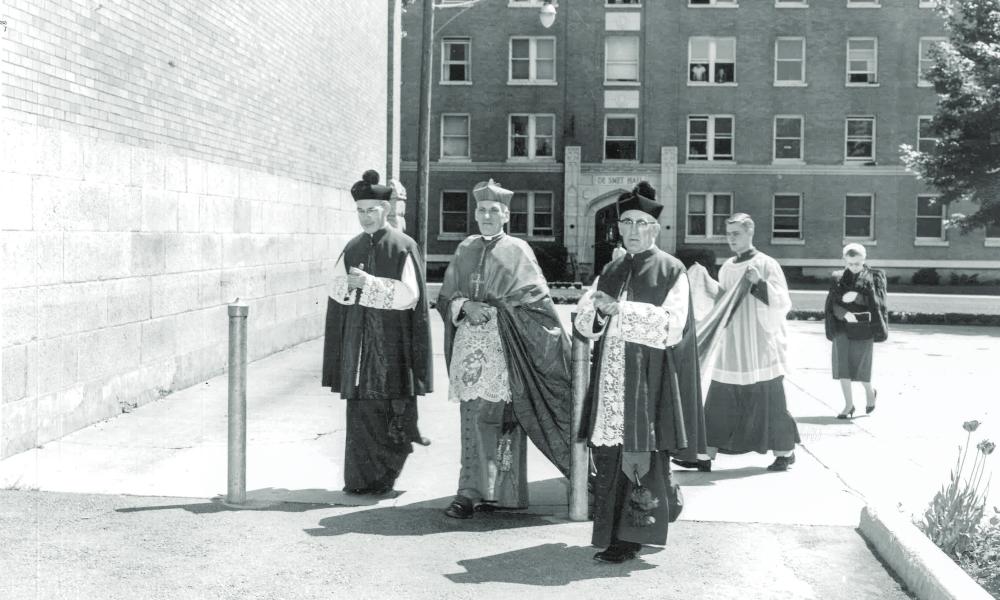
Remembering the other Father Pautler
In this third installment of reflections on priests who have influenced my life, I cannot overlook Msgr. Hugo Pautler, who flourished from 1932 to 1988. I will take the liberty of referring to him as “Hugo.” Were he living, I would be admonished: “We are a monsignor, and that is how we are to be addressed.” But 30 years after someone’s death, let us remember the good times.
Earlier in my priesthood, people occasionally mentioned: “I knew a Father (or Msgr.) Pautler in Walla Walla (or Clarkston).” Hugo was my dad’s first cousin, making me a second cousin. Or, as was correctly explained by Msgr. John Fahy of happy memory, “a first cousin once removed.” Hugo and my father shared a farming background in Colorado before both moved west. I don’t know whether Hugo encouraged Dad to come to Washington, but that’s where he landed and met Mom.
Hugo was pastor at St. Francis Parish in Walla Walla, where they married in 1941. Hugo was appointed pastor of Holy Family, Clarkston, in 1942, then returned to Walla Walla as pastor of St. Patrick following the death of the legendary John Callanan in 1953. Hugo remained deferential to the memory of Father Callanan. They are buried in the “priests’ circle” at Mountain View Cemetery where, per his instructions, Hugo’s monument is modeled after Father Callanan’s, “but not as high.”
Our family belonged to St. Francis, the Italian parish of our mother. I never served Mass at St. Patrick. My personal relationship with Hugo was minimal, but was cultivated by his occasional meals at our home. We dined on roast beef. Dad was a meat cutter, and I would hear: “You must get really good cuts of meat.” No, we did not. Dad would never take advantage of his position to bring home meat we couldn’t afford. Hugo was served chuck roast, not prime rib.
Hugo was back in Clarkston during my early years in ministry. Upon retirement, he lived there with his sister, Frances. We developed a Thanksgiving Day tradition: I drove down from Spokane and my folks came up from Walla Walla for dinner in Clarkston. Frances’ turkey was better than our roast.
I never ministered with Hugo. But some of my peers and the generation of priests ahead of me did. Most of them are gone now. I have the impression that they did not remember the good times. A copy of Hugo’s “House Rules” has come into my possession. Were his rules tyrannical? Hardly, but for young priests who had been subjected to the seminary rule for up to 12 years, these rectory rules were an insult. “Don’t you think I have the sense to figure this out myself?” a young priest might think. I guess Hugo didn’t agree, maybe with good reason. Here are a few excerpts:
• By comparison with other professions and occupations, the average priest has more time off than is necessary for relaxation or good for his priesthood. I have yet to find an “Apostle of Time Off” who observes the “Apostolate of Time On” with equal soul.
• Ordinarily during that part of the day when professional men are at work, we should not have the radio or television turned on. This is not conducive to priestly work, and is a source of admiratio to a parishioner or caller.
• Regarding stipends: Follow canon law and the synod. Let what is due to the pastor be given to him directly or put on his desk with notation.
• Let each assistant make his bed each morning and keep his room reasonably clean.
• Let sermons be well-prepared and not be less than 12 minutes — better 15 to 20 minutes. Our work is to call people to Church — not to help hasten them out of it.
• Experience has proven repeatedly that it is unwise and imprudent to invite high school boys and girls or any lay persons to your rooms or the dining room.
No one would take exception to that last one.
So, Hugo was no favorite of his assistants. It was another story with parishioners. At Hugo’s request and at his expense, there was a reception following the vigil of his funeral. I recall chatting with people, many of whom expressed their gratitude for his ministry, oftentimes illustrated by accounts of his personal solicitude. To them, he had been a pastor, not a penny-pincher or dictator. There were some good times, and they were remembered.



